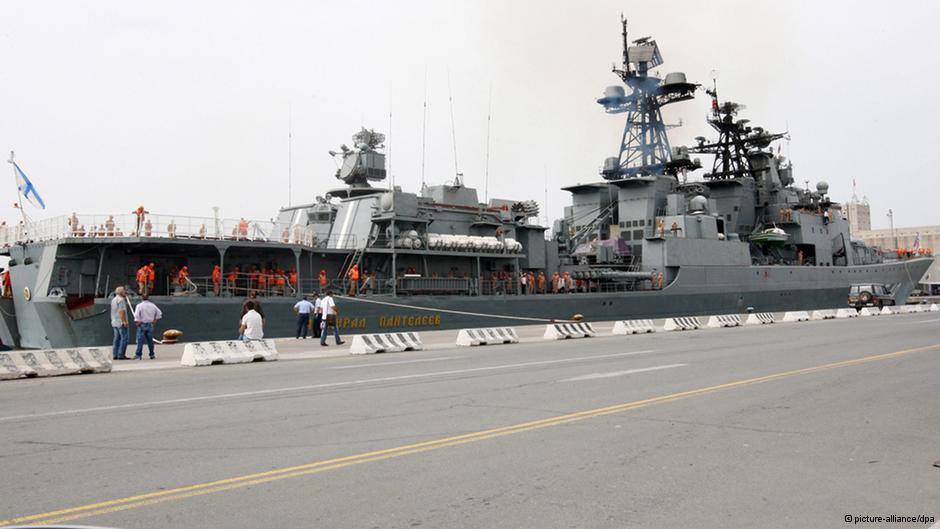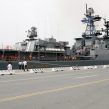
Russia Seeks Naval and Air Bases in Cyprus
Publication: Eurasia Daily Monitor Volume: 10 Issue: 131
By:

The past two years have seen a steady rise in Russia’s willingness to deploy its navy into the Mediterranean, to Syria, and Cyprus in order to demonstrate Russian power, support the Bashar al-Assad government, check Turkish designs on Syria and Cyprus, and thwart Western intervention in Syria. These Russian actions have nearly classically resembled gunboat diplomacy to gain strategic advantage and coerce other powers. And in addition to Moscow announcing a permanent naval deployment to the Mediterranean (see EDM, August 16, 2012; March 7, 2013), the Kremlin is now adding to that escalation with the apparent request for military basing in Cyprus. Such reports are not new; Cyprus denied that Russia had made such a request back in summer 2012 (Interfax, July 26, 2012). But now more detailed information suggests that Russia has appealed to Cyprus for permission to set up a naval base at Limassol and an air base at Paphos.
Cypriot sources claim that there has been an upsurge in bilateral diplomatic activity between Nicosia and Moscow in the last two months over requests for use of the Andreas Papandreou Air Base at Paphos and the port at Limassol (www.cypruys-mail.com, June 30; Cyprus News Agency, June 21; Intefax, June 24). Moreover, reportedly, the Russian Navy’s floating ship-repair yard might move from Syria to Cyprus (Komsomolskaya Pravda, June 27). This would accord with the recent sudden withdrawal of Russian forces from Syria (The Guardian, June 26). Naturally, such reports have produced controversy in Cyprus, if not beyond. Cyprus Mail Online charged that any agreement with Russia concerning military bases is incompatible with Cyprus’ obligations regarding cooperation with the North Atlantic Treaty Organization (NATO) (Cyprus Mail Online, July 2). Turkish papers, meanwhile, indirectly related the Russian request for a base to the unresolved energy tensions between Turkey, on the one hand, and Cyprus and Israel, on the other. These tensions have grown out of the discoveries of natural gas in 2010 in the so called Aphrodite field in the Eastern Mediterranean (Hurriyet Daily Online, June 29).
Surprisingly, these developments have generated little commentary in the Western or Russian press. Nonetheless, Moscow’s basing request perceptibly ties into the increasingly aggressive Russian posture in the Middle East and the Mediterranean. As Syria becomes too unstable to serve as a base for the Russian Navy, Cyprus’ desirability grows commensurately. Clearly, Moscow sees the naval flotilla it is deploying to the Mediterranean as a force optimized for combat missions that depends on air support, if not local air superiority. Russia’s Mediterranean force may also be tasked with amphibious operations, and the air base at Paphos would then logically serve as a launching ground for inserting forces and equipment designated for such missions. In that case, the request made by Moscow would mark a serious intensification or escalation of Russian ambitions and capabilities for power projection into the Middle East.
Nor is Syria the only target of such activities. The defense of energy holdings is also a fundamental mission for Russia’s navy. Moscow has for a long time expressed its interest in participating in any Cypriot exploitation of the gas finds around the island, and Russia’s gunboat diplomacy in 2011 was intended to warn Turkey against threatening Cyprus over those fields. It is entirely possible that defending Cypriot fields or offshore exploration facilities would be part of the operational mission for a Russian force stationed at the naval and/or air base in Cyprus. Those forces would then represent a warning to Turkey, as well as to the West in general, about intervention in Eastern Mediterranean issues.
A third consideration is that Moscow risked losing some of its clout in Cyprus due to Cyprus’ well-known economic weakness. In the financial crisis that occurred on the island earlier this year, Moscow proved unable and unwilling to bail out Cyprus. Therefore, Moscow may well have felt that its standing in Nicosia declined given Cyprus’s high expectations of Russia that were then dashed. As is often the case in such high-profile bilateral deals as military basing agreements, strategic, diplomatic and economic considerations tend to go together.
It remains to be seen whether or not a Russian military presence will materialize in Cyprus and what the Western reaction would be to such a development. Yet, the silence to date is puzzling. And if Russia is once again employing gunboat and other forms of coercive diplomacy to extend its capabilities into the Mediterranean and Middle East, that is no small matter for the countries of Southeastern Europe and the Levant or for NATO. Such a trend would, if unopposed, mark a victory for those in Moscow who see the West as weak and wish to push it while expanding the frontiers of Russian power.




